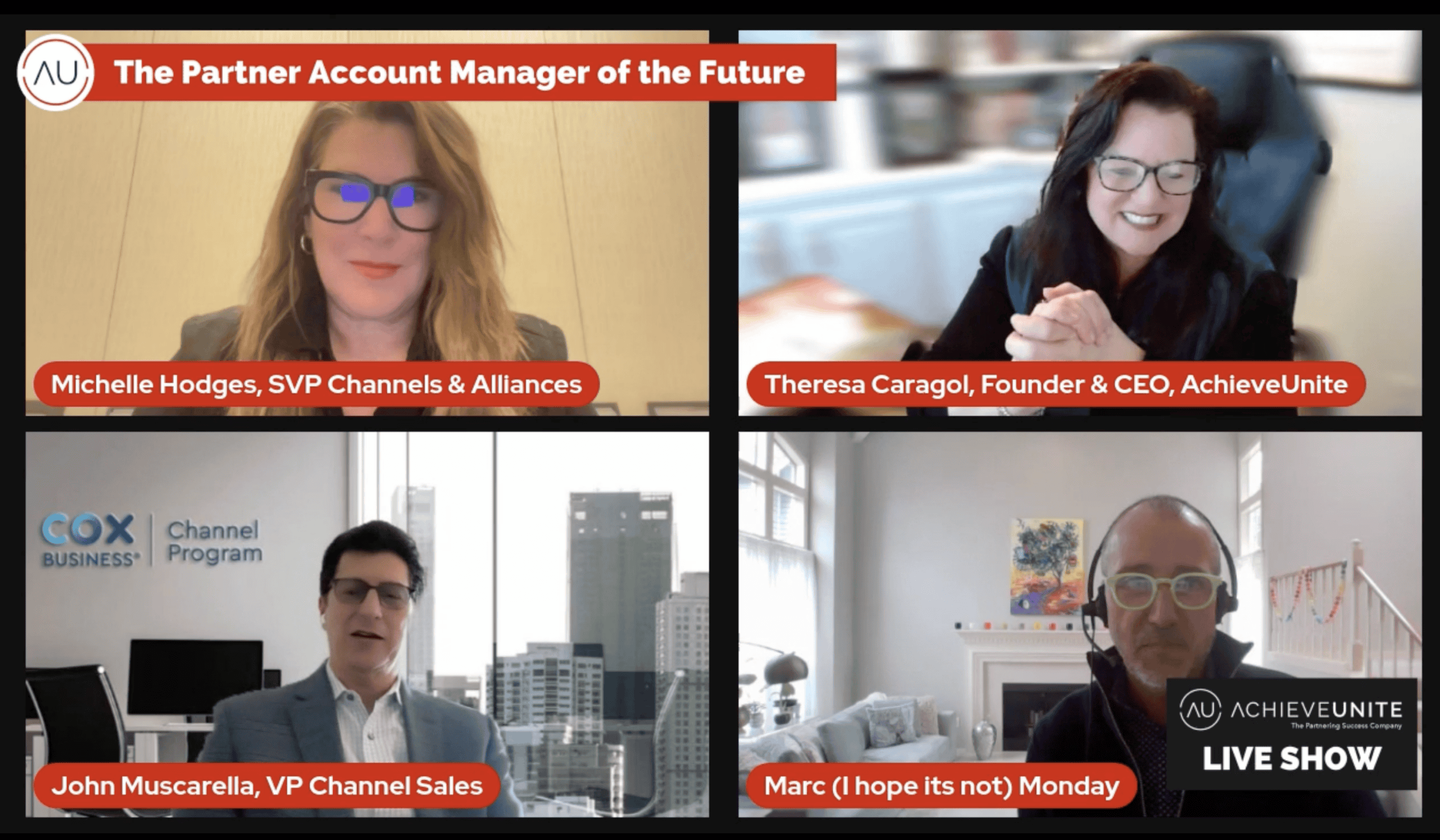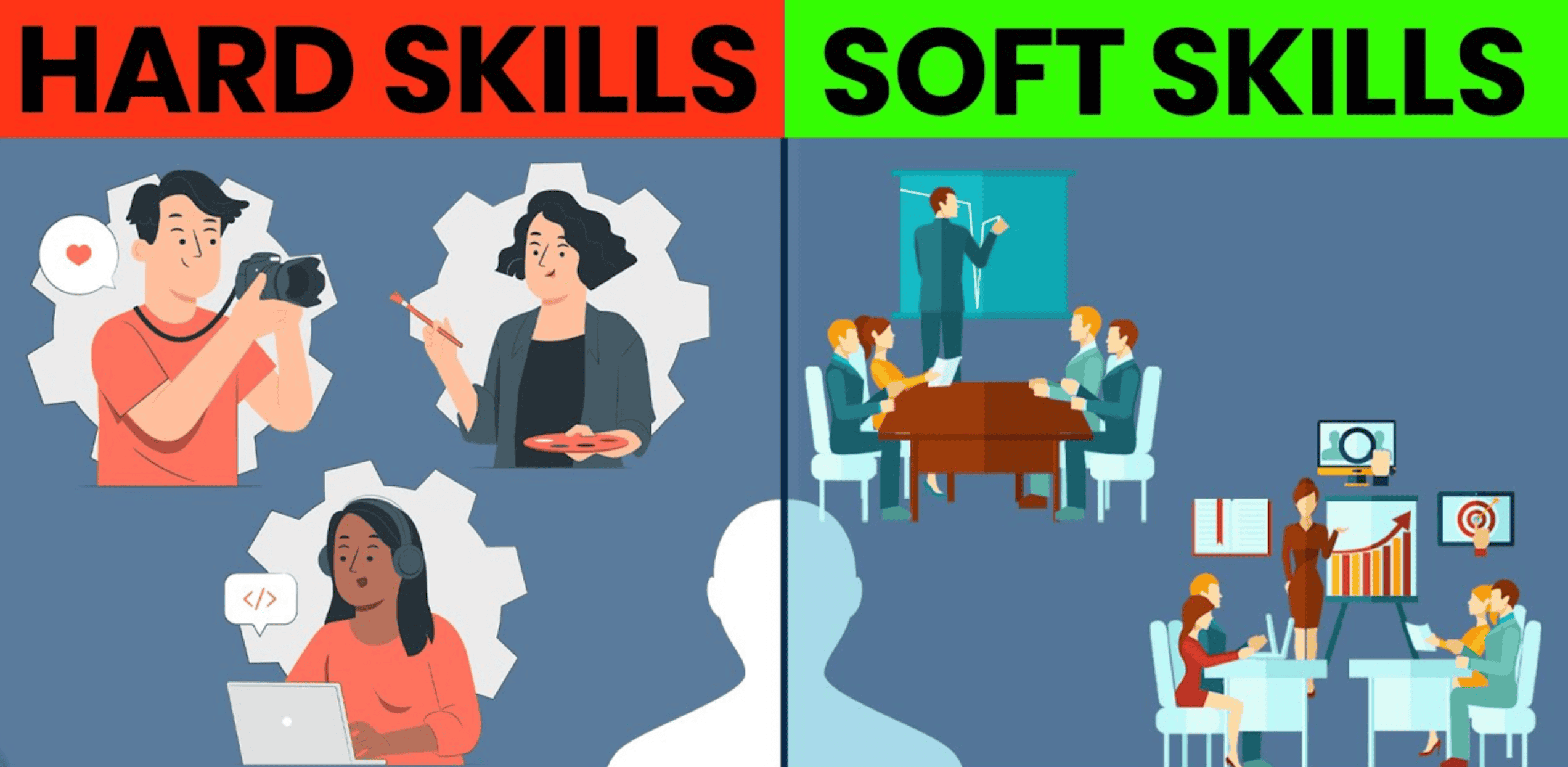This week we held a highly attended LinkedIn Live session: The Partner Account Manager of the Future. If you didn’t have a chance to attend, I hope you can find time to watch the replay because the partner ecosystem is evolving rapidly. We explored the evolution of the PAM/CAM role and discussed the attributes, strategies, and distinctive approaches that will define partner sales success in the future. The panel consisted of:
-Marc Monday -Senior VP of Sales, Sage
-Michelle Hodges – Global Channel & Alliances Chief, Ivanti
-John Muscarella -VP of Channel Sales, Cox
–Theresa Caragol – CEO, AchieveUnite
The Partner Account Manager of the future must become a dynamic force, blending traditional relationship-building skills with a forward-thinking, tech-savvy approach. By embracing adaptability, fostering collaboration, and staying ahead of industry trends, the future-ready PAM/CAM will not only navigate change successfully but will also drive innovation and growth for both their organization and their partners to become a strategic asset to their company. Here are some key points and highlights from the session:
1. Reasons the PAM/CAM Role Needs to Change Now
“The reality is it is very hard to keep up right now. For the PAM role, you’re at the neck because you’re a product manager, product marketing manager, marketing manager, sales manager, and operations manager. You’re a seller. You have all these roles, and everyone is coming at you. So, this broader economic climate, the broader economic expectations, the pace of change, they’re all kind of converging in this profession around partner account management.” – Marc Monday
“Because what made us successful last year, the year before, won’t necessarily be what’s required over the next 2 or 3 years because of all the changes and expectations. It’s an ever-evolving skill set and, experience that we need in this role.” – John Muscarella
2. Focus on the Joint Business Plan and Strategic Goals
“If you want to be great at your job and be recognized, is to be sure that the joint business plan and those metrics roll up really tightly, that you’re super clear on how you’re delivering on value. Because if you decide to go out and build a partnership that has nothing to do with your company’s value drivers, you’ll be in trouble.” – Michelle Hodges
“I have to each day I have to look up and say, what am I paid to do? Oh, that my job is not email. Email is a tool. My job is to make those things happen and you must remind yourself constantly.” – Marc Monday
“A trap that a lot of people get caught in, and I’ve seen it every day where it’s all responding to emails. I’m being responsive. I’m getting them. I’m providing them. That’s not results, that’s activity. The sooner team members can identify the difference and focus on the results, the better off they will be. Being results-oriented in the territory or the partner you’re supporting, that’s what you must really be focused on.” – John Muscarella
3. From Relationship-Building to Strategic Influence
While traditional relationship-building remains valuable, the future-ready PAM/CAM goes beyond the traditional bonding or golf course. They cultivate authentic and strategic influence, leveraging data-driven insights and proactive collaboration to drive quantifiable outcomes. This includes:
- Identifying ideal partners aligned with your company’s goals.
- Assessing their fit through in-depth analysis, not just casual interactions.
- Onboarding them effectively by understanding their motivations and building a joint business plan with clear metrics for success.
4. Own Your Continuous Learning and Development, Expand Your Role
“You are ultimately responsible for your career. Get clear on what’s it going to take for me to be good in this job and what development do I need? Then build yourself a plan to go out and go after that. As you look at future roles as well, work backward: what are the skill sets that I need to do it? Advocate for yourself and reach out either into your company or into the market to be able to build those experiences going forward.” – Michelle Hodges
“Your job as a PAM is also marketing, and if you don’t think you’re a marketer, then you’re in trouble because you need to market internally. What’s the value of the channel? You need to market to the partner: what’s the value of my brand? And importantly, you need to help that partner market to their customer. And too many times I’ve seen traditional legacy partner account management resources say that’s not my role, it’s for the marketing department, but we all must do it.” – Marc Monday
5. Soft Skills: The Cornerstone of Success
While technical expertise is crucial for PAM/CAMs, soft skills are the unsung heroes that truly differentiate high performers. These skills allow you to build genuine connections, navigate complex situations, and inspire collaboration within the partner ecosystem. Key soft skills include:
- Emotional Intelligence: Understanding and managing emotions for stronger relationships.
- Communication: Clearly articulating ideas to influence stakeholders.
- Active Listening: Building trust by truly understanding partners’ needs.
- Problem-Solving: Collaboratively solving issues to strengthen partnerships.
- Negotiation: Reaching win-win agreements for mutual benefit.
While some are innate, others can be honed through training and development. Look for practical programs like role-playing and case studies. Consider tools like AchieveUnite’s PQi® to assess and develop your Emotional Intelligence, partnering trust, and collaboration, and our People Development Programs that will help develop your partnering abilities and individual essential skills to transform you into a partnering expert
6. Drive Cross-functional Collaboration and Build Trust
“Develop your Influence Quotient. You know, your influence internally, externally, with other suppliers, with distributors. I mean, that is key to this position. You’ve got to show the value to that partner organization that’s trying to offer your solutions and constantly finding those key relationships that you can leverage.” – John Muscarella
“Don’t go it alone. Build a big tent. You want to bring as many people into your business as possible. I know it increases the complexity. I know it requires you to explain more, but you need the whole organization together with you on that engagement. So slow down to speed up, focus on results and activities and long term.” – Marc Monday
“Trust is very important in collaborative partnerships. With our PQi® tool, we know that regulating emotions is one of the trust-building, strengths. Our ability to read both ourselves and then helping others do that builds trust.” – Theresa Caragol
7. Communicate with Stakeholders and Provide Meaningful Data
“You must know how your revenue stream contributes holistically to the whole organization. You know what the contribution is, how it impacts the business, the margin that you generate, the operating the free operating cash flow. You need to be able to speak that language and show what you are bringing to the table. Demonstrate the value and the contribution.” – John Muscarella
“Whether you manage a territory or manage one single partner, you’re the CEO of that business. You need financial help. You need marketing help. You need services, enablement, marketing, and education. Build yourself, your board, and your leadership team for how you’re going to go after that. Build those relationships and tie your metrics and the value that your partner is delivering to what’s going to help them be successful.” – Michelle Hodges
You may have the right programs and a good portfolio of partners, but does your partner sales team have the necessary hard and soft skills that are essential to take your business into future growth? In recognizing the pivotal and ever-changing role of your Partner Account Managers (PAMs), investing in their training and development becomes paramount. AchieveUnite offers Partnership Performance Advisor programs for taking PAMs/CAMs to the next level and accelerating sales.
What are your thoughts on how the PAM/CAM role has changed and needs to evolve? I’d love to hear your feedback and answer any questions.


